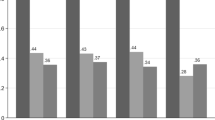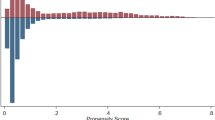Abstract
The impact of grandparents’ employment on grandparental childcare has been examined repeatedly, but the findings have so far been inconsistent. We contend that these inconsistencies may have resulted from variations in model specification and crude measurement of employment status. Furthermore, we assert that earlier research overlooked gender differences in the ability to combine paid employment and caregiving as well as variations between maternal and paternal grandparents. We also question the causal interpretation of earlier findings that were based on cross-sectional data. We revisit the issue of the impact of the intensity of employment and analyze SHARE data from 19 countries. We find a significant positive association between part-time employment (as compared to full-time employment) and the frequency of grandparental childcare in a cross-sectional sample, but only among paternal grandmothers. Capitalizing on the panel component of SHARE, we use a within-person estimator to show that this association is unlikely to reflect a causal effect of the intensity of labor market attachment on the frequency of the care of grandchildren, but more probably results from omitted variable bias. We argue that grandparents most likely to provide (intensive) childcare are also most likely to adjust their employment in anticipation of caregiving. The paper documents the usefulness of role strain theory among grandparents and highlights that part-time jobs may reduce role conflict and may thus make grandparenting a more easily manageable experience.
Similar content being viewed by others
References
Aasve A, Meroni E, Pronzato Ch (2012) Grandparenting and childbearing in the extended family. Eur J Popul 28:499–518
Allison PD (1999) Logistic regression using SAS: theory and application. SAS Institute, Cary
Baydar N, Brooks-Gunn J (1998) Profiles of grandmothers who help care for their grandchildren in the United States. Fam Relat 47:385–393
Bengtson VL (2001) Beyond the nuclear family: the increasing importance of multigenerational bonds. J Marriage Fam 63:1–16
Bengtson VL, Roberts REL (1991) Intergenerational solidarity in aging families: an example of formal theory construction. J Marriage Fam 53:856–870
Cherlin A (1978) remarriage as an incomplete institution. Am J Soc 84:634–650
Craig L, Mullan K (2011) How mothers and fathers share childcare: a cross-national time-use comparison. Am Sociol Rev 76:834–861
Danielsbacka M, Tanskanen AO (2012) Adolescent grandchildren’s perception of grandparents‘involvement in UK: an interpretation from life course and evolutionary theory perspective. Eur J Ageing 9:329–341
Geurts T, Van Tilburg T, Poortman AR, Dykstra PA (2015) Child care by grandparents: changes between 1992 and 2006. Ageing Soc 35:1318–1334. doi:10.1017/S0144686X14000270
Glynn K, Maclean H, Forte T, Cohen M (2009) The association between role overload and women’s health. J Women’s Health 18:217–223
Goode WJ (1960) A theory of role strain. Am Sociol Rev 25:483–496
Gray A (2005) The changing availability of grandparents as carers and its implications for childcare policy in the UK. J Soc Policy 34:557–577
Guzman L (2004) Grandma and grandpa taking care of the kids: patterns of involvement. Child Trend Res Brief 2004:1–9
Haller M, Hoellinger F (1994) Female employment and the change of gender roles: the conflictual relationship between participation and attitudes in international comparison. Int Soc 9:87–112
Hank K, Buber I (2009) Grandparents caring for their grandchildren: findings from the 2004 Survey of health, ageing, and retirement in Europe. J Fam Issues 30:53–73
Hansen T, Slagsvold B (2014) Feeling the squeeze? The effects of combining work and informal caregiving on psychological well-being. Eur J Ageing. doi:10.1007/s10433-014-0315-y
Igel C, Szydlik M (2011) Grandchild care and welfare state arrangements in Europe. J Eur Soc Policy 21:210–224
Information Sheet No. WT-4 (2004) International Labour Office, Geneva. http://www.ilo.org/wcmsp5/groups/public/—ed_protect/—protrav/—travail/documents/publication/wcms_170717.pdf. Accessed 7 Nov 2013
International Standard Classification of Occupations (2012) International Labor Office, Geneva
Lee J, Bauer JW (2010) Profiles of grandmothers providing child care to their grandchildren in South Korea. J Comp Fam Stud 41:455–475
Luo Y, LaPierre TA, Hughes ME, Waite LJ (2012) Grandparents providing care to grandchildren: a population-based study of continuity and change. J Fam Issues 33:1143–1167
Meyer MH (2012) Grandmothers juggling work and grandchildren in the United States. In: Timonen V, Arber S (eds) Contemporary grandparenting: changing family relationships in global context. Policy Press, Bristol, pp 71–90
Morrow-Howell N, Tang F, Kim J, Lee M, Sherraden M (2005) Maximizing the productive engagement of older adults. In: Wykle ML, Whitehouse PJ, Morris DL (eds) Successful aging through the life span: intergenerational issues in health. Springer Publishing Company, New York, pp 19–54
Nock SL (1995) A comparison of marriages and cohabiting relationships. J Fam Issues 16:53–76
Opree SJ, Kalmijn M (2012) Exploring causal effects of combining work and intergenerational support on depressive symptoms among middle-aged women. Ageing Soc 32:130–146
Payne S, Doyal L (2010) Older women, work, and health. Occup Med 60:172–177
Silverstein M, Marenco A (2001) How Americans enact the grandparent role across the family life course. J Fam Issues 22:493–522
Uhlenberg P, Hammill BG (1998) Frequency of grandparent contact with grandchild sets: six factors that make a difference. Gerontol 38:276–285
Van Bavel J, De Winter T (2013) Becoming grandparent and early retirement in Europe. Eur Sociol Rev 29:1295–1308
Walker A, Maltby T (2012) Active ageing: a strategic policy solution to demographic ageing in the European Union. Int J Soc Welf 21:S117–S130
Wang Y, Marcotte DE (2007) Golden years? The labor market effects of caring for grandchildren. J Marriage Fam 69:1283–1296
Yong F (2008) Population aging, structural factors, and types of grandparenting: new form of the division of labor? In: Conference Papers—American Sociological Association, 1–20
Acknowledgments
This research received financial support from the Czech Science Foundation (Grant No. 13-34958S). This paper uses data from SHARE wave 4 release 1.1.1, as of March 28th 2013 and SHARE wave 1 and 2 release 2.5.0, as of May 11th 2011. The SHARE data collection has been primarily funded by the European Commission through the 5th Framework Programme (project QLK6-CT-2001-00360 in the thematic programme Quality of Life), through the 6th Framework Programme (projects SHARE-I3, RII-CT-2006-062193, COMPARE, CIT5-CT-2005-028857, and SHARELIFE, CIT4-CT-2006-028812) and through the 7th Framework Programme (SHARE-PREP, No. 211909, SHARE-LEAP, No. 227822 and SHARE M4, No. 261982). Additional funding from the U.S. National Institute on Aging (U01 AG09740-13S2, P01 AG005842, P01 AG08291, P30 AG12815, R21 AG025169, Y1-AG-4553-01, IAG BSR06-11, and OGHA 04-064) and the German Ministry of Education and Research as well as from various national sources is gratefully acknowledged (see www.share-project.org for a full list of funding institutions).
Author information
Authors and Affiliations
Corresponding author
Additional information
Responsible editor: Howard Litwin.
Rights and permissions
About this article
Cite this article
Lakomý, M., Kreidl, M. Full-time versus part-time employment: Does it influence frequency of grandparental childcare?. Eur J Ageing 12, 321–331 (2015). https://doi.org/10.1007/s10433-015-0349-9
Published:
Issue Date:
DOI: https://doi.org/10.1007/s10433-015-0349-9




